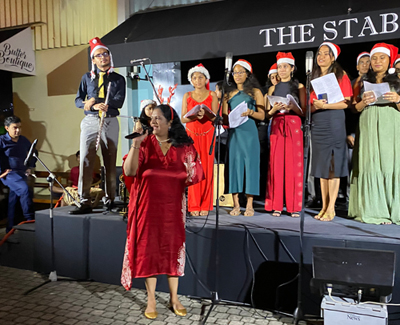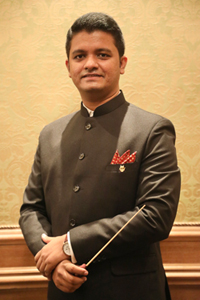Those familiar carols that resonate come every Christmas

Sureka and a group of choristers: Ringing out the joy of Christmas music
The most wonderful time of the year, known to all Christians and most others as Christmas is once again, upon us. It means something different to everyone but some aspects of the season are dear to all such as family gatherings, food, drink, and presents. Along with the decorations that sometimes go up as early as November, another inescapable element of the season is the music. Wherever you go, you are bound to hear Christmas carols, both old and contemporary being played on the radio, through speakers or sung by choral groups in the lobbies of hotels. While we know the words and tunes of these carols that are sung year after year, we often don’t quite know how they came to be.
The well-loved carol ‘Good King Wenceslaus’ for instance is the true story of Wenceslaus I, who was not a king but Duke of Bohemia in the mid-900s. The story goes that his brother Boleslav the Cruel had him assassinated. Wenceslaus, due to his generosity and charitable acts was declared a king posthumously and is now the patron saint of the Czech Republic.
Possibly the most famous and popular carol of all, ‘Jingle Bells’, was not intended for Christmas but for the American holiday of Thanksgiving. Renamed and published in 1857 by James Lord Pierpont, it made history two centuries later when it became the first song to be broadcast in space.
The Carol of the Bells was originally never about Christmas; instead, the original composition ‘Shchedryk’ told the tale of a swallow flying around at the coming of spring and wishing all a bountiful year. The original Ukrainian song based on old folk songs was composed based on just four notes. Peter J. Wilhousky rearranged the Ukrainian song, changing its theme to something that is now strongly associated with Christmas.

Harin Amirthanathan: ‘Bethlehem Dawn’ a special carol
Almost every other carol has a story or legend associated with it, and though fascinating, what is more interesting is how these carols have come to be significant to us. During the season, choral singers, conductors, directors, and musicians train and perform these over and over again. Despite the repetition, they still have carols that resonate with them.
“I have always made it a point to persuade my choirs to sing the globally cherished carol ‘Silent Night’ in its original German version – Stille Nacht- as the opening verse,” says Francis D’Almeida, choral director of the choirs of St Joseph’s College, Good Shepherd Convent, Ave Maria Convent and many others. Silent Night – or Stille Nacht- was written by Austrian priest Joseph Mohr and the music was composed by Franz Zaver Guber. The touching story that accompanies the carol tells the tale of German and Allied armies in the First World War who were in the middle of fighting in the trenches. At midnight on December 24, 1914, a soldier from the Allied armies, started playing the tune on his harmonica and the German soldiers began singing together. Soon, all laid down their weapons and exchanged food and wine. The First World War was over – if only for just a few days.
The war was to recommence a few days later, but without the earlier bitterness and animosity. Francis, who finds the theme of unity heartwarming, remarks, “the sweetly melodious strains of Stille Nacht has engulfed the globe and continues to pervade relentlessly pleading for peace.”

Dilini Perera Fox: Drawn to more unusual carols
Talented flautist and musician Sureka Amerasinghe, director of the Royal College choir and previously of the choir of Ladies’ College also considers ‘Silent Night’ to be a personal favourite, for its simplicity. Her true favourites, however, lie in the compositions of her students. While directing the Ladies’ College choir, she encouraged her students to work on composing original music and for Christmas, commissioned a new carol every year from one student which would then be performed at the carol service. “We did our own interpretation of ‘The Festival of Nine Lessons and Carols’ but tried to stick to some sort of structure yet also adapt.” Giving her students a gentle nudge to be more creative certainly worked out as some have gone on to become successful musicians and composers.
Peter Warlock’s ‘Bethlehem Down’ is one of the more significant carols to Harin Amirthanathan, choral director of the Colombo Philharmonic Choir and Contempo, the PPA choir of St. Bridget’s Convent. He remarks that Warlock and English poet George Henry Bruce Blunt created something sublime and timeless - a moment of repose and reflection amongst the usual glorification and exultation of Christmas music. “Whenever I hear Bethlehem Down in a carol service, it always takes me someplace else – to some sort of otherworldly way where time stops and there is a moment of real contemplation,” says Harin, who considers the work the high point of Warlock’s output and one of the most poignant and special pieces in the repertoire of English music.
Dilini Perera Fox, choral director of the Holy Family Convent Bambalapitiya choir is drawn to the more unusual carols as she finds that the more unusual a carol is, the more memorable it will be. Her current favourite is John Rutter’s ‘Joseph’s Carol’ which was released last year in honour of the Oxford Vaccine Team. She also tends to move towards carols in a foreign language: “trying to express the joy of Christmas in another language is always a fun and challenging thing to do as a singer.”
Searching for an ideal partner? Find your soul mate on Hitad.lk, Sri Lanka's favourite marriage proposals page. With Hitad.lk matrimonial advertisements you have access to thousands of ads from potential suitors who are looking for someone just like you.


